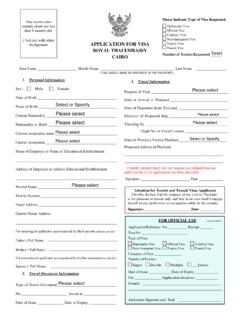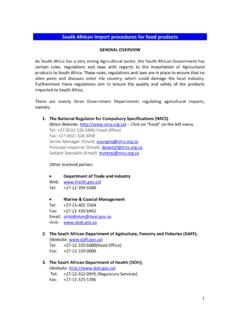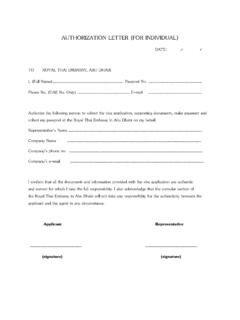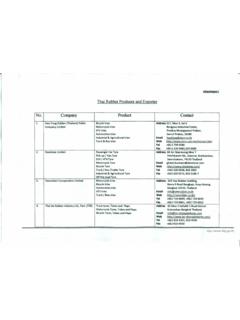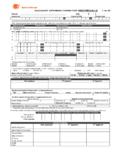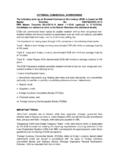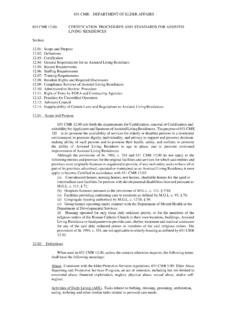Transcription of How to set up a company in South Africa Business …
1 How to set up a company in South Africa Business entities and registration procedures The most common Business entities in South Africa are: 1. Companies 2. Close corporations 3. Partnerships and sole traders 4. Joint ventures 5. Local branch of a foreign company 6. Business trusts 1. Companies (private and public) These entities may be public (limited) or private (proprietary limited), and are the most common investment vehicles for foreign investors operating in South Africa . They exist as separate legal entities from their shareholders and/or members.
2 No distinction is made in the Companies Act between companies that are locally owned and those that are foreign owned and, once formed, a company has an unlimited lifespan. Both public and private companies must be incorporated and registered with the Registrar of Companies. Companies incorporated in South Africa must have a registered office and maintain certain statutory and accounting records in South Africa . If the accounting records are maintained outside of the Republic, the company must receive financial information and returns that will enable the statutory financial statements to be prepared.
3 Approval of the name of the company must be obtained from the Registrar of Companies before incorporation. Public companies may offer their shares for sale to the public, although they need not be listed on the stock exchange or the public to hold an interest in their shares. The number of shareholders is unlimited, there are no restrictions on the transfer of their shares, and they must file a copy of their annual financial statements with the Registrar of Companies, which are available for public inspection.
4 Private companies, on the other hand, may not offer their shares for sale to the public. The right of transfer of their shares is restricted and the number of members is limited to 50. Private companies are not required to file their annual financial statements with the Registrar of Companies; thus, they are not available to the general public. They must include the word "Proprietary" or (Pty) at the end of the registered name immediately before the word "Limited" or "Ltd". For both types of companies, an audit by a registered accountant and auditor is obligatory.
5 The Companies Amendment Act, 1999 (Act 37 of 1999) makes provision for: A company to acquire its own shares under certain circumstances, thereby providing a mechanism to restructure the company s capital and unlock shareholder value; Disclosure of beneficial interest in securities to enable companies to ascertain who its shareholders are; and The mandatory appointment of a company secretary for all public companies, excluding a share block company . 2 In order for the company to buy back its own shares, the following conditions must be met: The company s articles of association must permit share buy backs Shareholders must be circularized regarding the proposed buy back, and a special resolution must be passed by the shareholders authorising the buyback The company should be solvent and liquid (otherwise the directors will be jointly and severally responsible).
6 And following the buyback, the company s share capital should not consist wholly of redeemable shares. registration requirements All required registration forms may be purchased from a stationer dealing in statutory forms for approximately R100. To reserve a name, a CM5 application form (duplicate copies are no longer required), stamped with R50 in revenue stamps, must be submitted to the Registrar s office. In order to save time and costs, it is recommended that three to four alternative names be furnished in order of preference.
7 A preliminary search can be done on the Companies and Intellectual Property registration Office of South Africa (CIPRO) website. Following approval, the name will be reserved for a period of two months. Within this period, the documents for incorporation should be submitted. An extension of one month may be granted with the submission of the CM6 form, stamped R20 in revenue stamps. The Registrar must receive the application for extension before the end of the first two month period. Legal and other professional fees relating to the registration of a company depend on the complexity of the individual application.
8 For ordinary applications, without complications, legal costs start at about R4 500. Standard versions of a memorandum and articles of association are included in the Companies Act. A company may choose to submit its own version. However, this may slow down the approval process, as they would require close examination by the Registrar s office. All companies must have an independent auditor to produce annual financial statements. At the time of incorporation, the auditor is required to sign an acceptance of the office.
9 registration applications must be submitted by hand to the Office of the Registrar in Pretoria. If no errors or omissions are made, the application will be processed in three (3) to five (5) Business days. A complete application includes: Copy of an approved CM5 Power of attorney (if an attorney is used or if more than one subscriber exists) CM22 (notice of postal address and registered office address), in duplicate Memorandum and articles of association, in duplicate (one copy bound in book form and certified by a notary public) CM1 certificate of incorporation CM2 (first page of memorandum of association)
10 , stamped with a minimum registration fee of R350, plus R5 per R1 000 of share capital or part thereof and/or R5 per 1 000 shares if no parvalue shares CM44 (signature page for subscribers) CM46 (certificate to commence Business ), stamped R60 3 CM47 for each director is being conducted by the members who must be natural persons ( individuals). Another company , close corporation or trust cannot, therefore, own a close corporation. In a close corporation, the members have the rights and obligations of both shareholders and directors, and consequently, ownership and management of the corporation are not separated.


